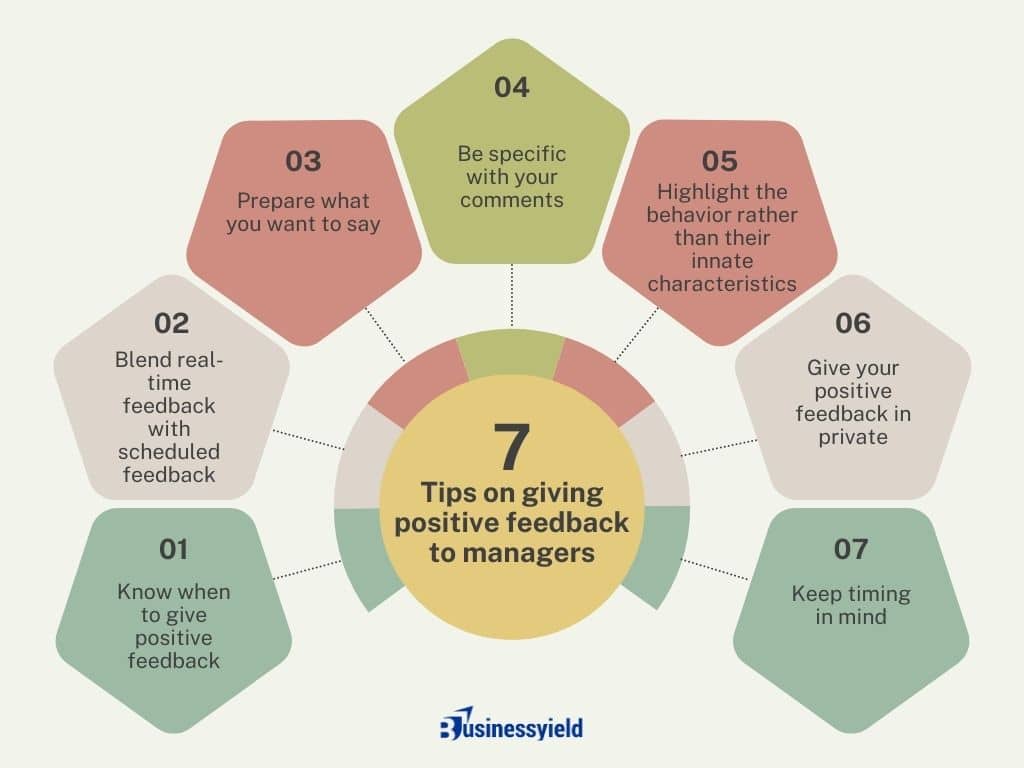What does positive feedback (or any feedback, for that matter) to managers entail? Well, you know how you can sometimes receive a mail from your supervisor pointing out something that you did, either good or bad? Well, this is when you’re the one doing the pointing.
So, in case you’re still wondering, yes, you are absolutely allowed to write a letter to your boss that goes something like, “Good day Mr. Stanley, I really admire your work ethic and dedication. It inspires me to also put in 110%. Kudos, boss.” Or maybe you’re none too pleased with him, so you can go, “Hello, I am not too pleased with the fact that you can be unreachable sometimes. It would be nice if you made a habit of calling back when you see a missed call.”
Only, maybe with a little more tact and not in those exact same words for the latter. Unless, of course, you’re tired of your job.
Now, I understand if you’re feeling a little weird about giving your boss critical feedback since we’re all used to it being the other way around. It’s like asking water to flow uphill. However, this is a crucial and much-overlooked part of employee relations. Keeping the line of communication open and providing effective feedback can help you both improve your performance and well-being, as well as your working relationship with your manager.
After all, managers are human also, and as such, are also prone to mistakes. Or in need of a little pick-me-up from time to time.
That is where I come in. Having worked on both sides of the fence – team member and manager – I will show you how to provide positive feedback to your managers without causing any hard feelings.
Key takeaways
Manager and employee feedback is an important part of any thriving company culture.
Giving honest feedback to your manager allows you to develop a mutually respectful, professional relationship.
Many employees worry that giving their manager positive feedback may simply come across as an attempt to get ahead in their careers.
However, by doing it properly, you’ll be able to candidly share your opinions about their management style and how it impacts the workplace.
Why is it important to give feedback to your manager?
Manager and employee feedback is an important part of any thriving company culture. If you have a professional, thoughtful manager, they should welcome any constructive feedback that allows for improvement. Team dynamics usually start from the top down, so the better your higher-ups perform, the better chance the whole team has to boost employee performance.
Giving constructive and positive feedback to managers is important for a variety of reasons, some of which include:
- Helping your manager or boss improve
- Building up your professional dynamic
- Improving your communication skills
- Solving grievances before they escalate
- Enhancing problem-solving skills
- Creating a healthy work environment
- Contributing to a healthy feedback culture
Giving honest feedback to your manager also allows you to develop a mutually respectful, professional relationship. You want your manager or boss to be able to take you seriously, especially if you’re looking to improve your leadership skills and move up in the company. If you pass on your chance to speak up when employee performance reviews come around, you might not be seen as strong-willed or capable of formulating your own opinions.
So, make your voice heard when your manager asks for feedback.
Participating in upward feedback also helps solve issues before they get any worse. For example, if you’re able to tell your manager that the rest of the team (yourself included) needs clearer goals early on in the quarter, you’ll avoid miscommunication and frustration later on.
Overall, feedback in both directions is good for both managers and direct reports, as well as the company as a whole. If everyone feels empowered to share their point of view appropriately and productively, the team dynamic will prosper and employee engagement and positive behavior will skyrocket.
Tips on giving positive feedback to managers
Now, you know why it’s important to give your manager positive comments. Hence, let’s walk through how to use it in practice.

Know when to give positive feedback
Knowing when to give positive feedback is half the battle. Keep in mind that reasons for giving feedback should be measured based on the individual, not on the size of the achievement.
For instance, let’s say your manager stepped up to help iron out a roadblock you were coming across in a project. Or your manager was able to secure an additional resource for a large-scale project that will help set you up for success.
Identify some moments where it feels right to give your manager positive comments. It can be as simple as a statement of gratitude for giving you a platform to present in a recent team meeting. Don’t overlook the small moments, too.
Blend real-time feedback with scheduled feedback
While it is important to keep the feedback fresh and relevant, there may not be an opportunity to give your boss real-time feedback in private. In these cases, take note to mention it in your next one-on-one meeting. Or you can schedule a separate time to discuss the positive comment with your manager.
In these cases, you’ll want to give your manager a heads up and schedule some time on their calendar to meet.
Prepare
Giving positive comments to your boss is much like giving them other types of feedback. To ensure you get your message across clearly, carve out a few minutes to prepare for your meeting. Know what you want to say, and try jotting down some example phrases or relevant adjectives to keep you on track.
Be specific
When formulating your feedback, it’s best to use examples and describe exactly what you found to be positive about their performance. For example, instead of simply telling them they’re good at resolving conflicts, explain how impressed you were with the way they mediated a conflict between two colleagues.
Give specific examples of why you appreciated their conflict-resolution skills. You can also mention how you appreciated your manager stepping in as a team player.
Highlight the behavior rather than their innate characteristics
Recognize behavior over traits. You shouldn’t attribute your manager’s success with customers to their natural people skills. Instead, note that they put time into listening and responding to each individual complaint until the customer is satisfied.
Highlighting behaviors signals the need to continue working on these skills rather than taking them for granted.
Give your positive feedback in private
When your message is constructive, it’s always better to give it in private. Alternatively, giving positive feedback to your colleague in public can be an even better way to show your appreciation or boost the receiver’s confidence. However, things are different when you’re giving positive feedback to your boss.
As a general rule of thumb, it’s good to give positive feedback to your boss in private. Giving them honest positive feedback in a private one-on-one or performance review will minimize your hesitancy at seeming too eager to please the boss.
Keep timing in mind
Positive feedback should be given as soon as possible after an achievement, making it easier for you and the manager to recall details so changes can be made. If the moment is left too long, the effectiveness of your feedback can be reduced significantly.
Give your boss feedback as close to the incident you’d like to praise. This is often how you should approach all types of feedback, especially constructive feedback. If the time passed is too long, it won’t be as impactful.
Below is a template that can help you give all kinds of feedback to your manager in different situations.
Manager feedback template
Benefits of giving your manager positive feedback
Positive feedback is a good way to encourage actions you’d like to see your manager take more often. Many employees worry that giving their manager positive feedback may simply come across as an attempt to get ahead in their careers. However, by doing it properly, you’ll be able to candidly share your opinions about their management style and how it impacts the workplace.
Here are some additional benefits to sharing positive feedback with your manager.
It builds rapport
Every manager and employee relationship is different. But the success of every relationship — manager or colleague — hinges on whether or not you have a rapport with the person. By giving positive comments to your boss, you’re investing in building rapport. And once rapport is established, your relationship opens up with other opportunities.
It can strengthen trust
Every relationship starts out with an opportunity to build trust. The same goes for the manager and employee relationship. And while there’s somewhat of a power dichotomy between the manager and the employee, both parties need to invest in building trust.
So when an employee responds with positive feedback to a manager’s style of management, it reinforces trust. By simply providing a positive comment, you’re helping to strengthen the trust between you and your manager.
It can open the door for other types of feedback
If your manager is invested in the employee and manager relationship, they’ll likely ask for feedback. But sometimes, asking for feedback can be intimidating.
Starting with positive feedback is a good icebreaker for other types of feedback, like upward feedback or constructive criticism. Of course, avoid the feedback sandwich where possible. However, positive feedback can open up the door to other types of feedback down the road, especially with built trust and rapport.
How you can provide feedback to your manager
When providing employee feedback to managers, it’s always best to avoid the personal and focus instead on business impact – both at the departmental and organizational levels. Managers need to know that their actions, words, and management style are tightly intertwined with employees’ productivity and results – and the business’s bottom line.
With that in mind, let’s look at some examples of how you might provide constructive feedback to your manager.
Communicating clear direction
You might want to inform a manager that their vague or incomplete directions meant a project took longer than it should – and resulted in time and money wasted:
“I want you to know how much I appreciate the opportunity you gave me to lead the redesign initiative. It has been a great chance for me to further my professional growth, and I – along with the other team members – are thrilled about the project.In looking back on the effort, I think you and I could have been more on the same page when it came to understanding goals and timelines.
Next time, I think we both could do better in terms of communicating the parameters and deadlines of the project.”
Work-life balance and burnout
With the hectic pace and rapidly changing dynamics of today’s world of work, you might have to remind your manager that work-life balance and the employee experience are still a top priority for the entire team.
“With all the challenges the whole team has faced in the past three years, I believe this might be a good time to step back and look at workloads – and how they are impacting our work-life balance and overall team performance. As our world of work has evolved so quickly, it would be a good way to boost morale and the employee engagement of our group – while recognizing the entire team’s recent accomplishments and the amazing job they have done in the face of many headwinds.”
Mental health
While written primarily from the perspective of the manager, a recent Harvard Business Review article, “How to Respond When an Employee Shares a Mental Health Challenge,” offers insight into how employees might approach the topic of mental health issues. It also shows how they can report interpersonal challenges to their managers.
This quote is taken directly from the HBS article as an example of how an employee might address the subject with the manager:
“To be honest, I’m actually going through some really tough stuff at home. It’s definitely affecting how I’m showing up at work. I’m getting support with it. But what I’d really love from you, if you’re open to it, is a little bit of extra time on that deadline? Is that doable?”
Development support
The rapid pace of workplace change means that you – as an employee – are looking for ways to further your development and advance your learning curve. Here’s how you might approach your managers to ask for training and development support.
The key here is to couch your request as positive feedback that will benefit the department, and boost employee engagement:
“As the pace of change continues to accelerate in the work we do, I believe the need for training and development is greater than ever. For that reason, I ask that we revisit our T&D budget for the year. There are a number of cutting-edge seminars and conferences that – with our attendance – would greatly increase our knowledge, expertise, and effectiveness. And, I should add, our bottom line.”
Management style
This may be one of the most challenging areas in which to provide feedback because it goes to the heart of your manager’s leadership qualities. But as mentioned earlier, it is important to identify and cite specifics as a launching pad for the conversation.
In fact, often the best approach to this issue is to lay the groundwork with actual examples and use that as a segue into a more general discussion about overall style.
“In the meeting the other day, I had hoped to finish my thoughts about the latest development project. I don’t know if you were aware, but you interjected as I was making my comments, and I was never able to finish my point. It’s hard for me to say, but that was not the first time I have felt this has happened.
Can we discuss whether you feel I talk too much during meetings? Or perhaps I take too long to get to my point?”
Areas of improvement
When discussing ways your manager can improve, it’s important to couch the discussion in the context of benefits to the business. Focus on how the manager – in their unique role – can boost efficiency, productivity, employee morale, and turnover.
It’s often effective to frame the discussion as an inward look at how both you and the manager can improve.
“Thank you for meeting with me today. I wanted to explore ways you and I can evolve a more productive working relationship. I know, for my part, I could apply myself better and complete projects in a more timely manner.
I wonder if you have any thoughts on how you could help me? Things you might do better, such as providing more clear direction or background?”
Recognition
Recognizing the achievements of you and your co-workers is a key responsibility of good managers and the hallmark of effective leadership. However many managers fail to carry out this vital and core responsibility. This is especially true in organizations where there is no comprehensive, strategic employee recognition program in place.
For these reasons, you must alert your manager when they fail to recognize the achievements of you – and your peers.
“I know you share my excitement that we brought in the massive data migration project ahead of schedule and under budget. I – along with some of the other team members – were wondering why we hadn’t heard your acknowledgement of our success? It would mean so much to us if you could perhaps publicly recognize the team effort it took to pull this off.
There have been many peer-to-peer celebrations of this project; it would be great to hear it from our manager, as well.”
When to avoid giving feedback to your manager
As we’ve established, sharing your feedback is usually a positive thing that ultimately results in a healthier more successful team dynamic and feedback culture. However, there are certainly occasions when providing feedback isn’t the best approach, especially if it’s negative, even if it feels like you’re providing constructive criticism:
- In the heat of the moment
- In front of your manager’s superiors
- When your manager seems stressed or during a very busy period
- When you’re feeling very frustrated or stressed yourself
- When the feedback is serious in nature and should involve human resources
- When you’ve just started a new role and haven’t yet developed a rapport
In short, use your best judgment to decide when it feels appropriate to go to your manager with feedback. It’s best to set aside time between yourselves to broach the topic if your manager isn’t offering you the opportunity themselves.
Also, make sure to sit on any negative feedback for a while so you’re sure of your opinions.
Recommended Articles
- Harnessing Feedback Loops: The Secret Weapon in Marketing Success
- How to Message a Recruiter on LinkedIn: A Detailed Guide
- Tailoring Your Savings: Which Account Type Matches Your Financial Goals in Canada
- 11 Best Customer Feedback Tools In 2024






